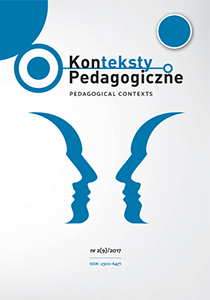Abstract
The contemporary period is the time of change, conversion, transformation, continual reformation and infinite exploration. The subject of our scientific search is the very status of posing educational questions: What is the way of grasping the subject of education in the context of insecurity, fluidity and also autoreferentiality of cultural discourses and practical cultivation processes? How to ask about education at all so that possible answers would keep the pace with challenges of culture that selfironically questions the validity of its expressions already in the moment of their beginning? The term “nihilism” has more than a hundredyearlong history and besides the classic meanings of this term attempts at recontextualisation of nihilism in current efforts to provide a cultural diagnosis keep on appearing at present. A contemporary Italian philosopher, Umberto Galimberti, belongs to these authors, too – mainly in connection to education. His work The Disquieting Guest. The Nihilism and the Youth (2008), is not to produce series of scientific treatises meant for privy communities of academics and their “hermetic circles”, but to denote the symptoms of cultural problems in a language accessible for every averageorientated reader. Galimberti compiled and analysed several basic symptoms of nihilism of the youth: 1. disinterest in school, bullying; 2. emotional aridity; 3. loss of the sense of intimacy; 4. seductiveness of drugs; 5. resorting to death; 6. carelessness, psychopathy, sociopathy; 7. ritual violence. In the final section, we show his answer to the question:How to overcome nihilism of the youth?
References
Bauman, Z. (2008). Tekuté časy. Život ve věku nejistoty. Prague: Academia.
Benasayag, M. & Schmit, G. (2007). L’epoca delle passioni tristi. Milan: Feltrinelli.
Farneti, R. (2010). A Minor Philosophy. The State of the Art of Philosophical Scholarship in Italy. Philosophia, 38(1), 1–28.
Galimberti, U. (2005). La casa di psiche. Dalla psicoanalisi alla pratica filosofica. Milan: Feltrinelli.
Galimberti, U. (2007). L’ospite inquietante. Il nichilismo e i giovani. Milan: Feltrinelli.
Galimberti, U. (2008). La morte dell ́agire e il primato del fare nell ́età della tecnica. Milan: AlboVersorio.
Galimberti, U. (2009). I miti del nostro tempo. Milan: Feltrinelli.
Galimberti, U. (2011). Il viandante della filosofia. Rome: Aliberti.
Galimberti, U. (2013). Znepokojivý host. Nihilismus a mládež. Ostrava: Moravapress.
Liessmann, K.P. (2008). Teorie nevzdělanosti. Omyly společnosti vědění. Prague: Academia.
Lipovetsky, G. (2008). Éra prázdnoty. Úvahy o současném individualismu. Prague: Prostor.
Palouš, R. (1991). Čas výchovy. Prague: SPN.
Rajský, A. (2009). Nihilistický kontext kultivácie mladého človeka. Filozoficko-etický pohľad. Bratislava: Veda – Trnava University.
Scheler, M. (1993). O studu. Prague: Mladá fronta.
Skalková, J. (2004). Pedagogika a výzvy nové doby. Brno: Paido.
In accordance with the recommendation of the Ministry of Science and Higher Education, which aims to counteract the practice of “ghostwriting” and “guest authorship,” all authors submitting their text for publication should attach an author’s statement which declares the contribution of each of the authors to the article. The printed and signed statement should be delivered by mail or other means to editor-in-chief Joanna Skibska or sent in the form of a scan to the following e-mail address: redakcja@kontekstypedagogczne.pl. The authors will not receive remuneration for publishing their papers. The editors reserve the right to make minor editorial changes to the articles which will not affect the substance of the article. We encourage all authors to prepare their articles in accordance with the guidelines for manuscript preparation. Download pdf file.
Authors transfer all copyrights and grant the journal the right of first publication with the work simultaneously licensed under a Creative Commons Attribution License that allows others to share the work with acknowledgement of the work's authorship and initial publication in this journal. All authors agree to the publishing of their email addresses, affiliations and short bio statements with their articles during the submission process.

